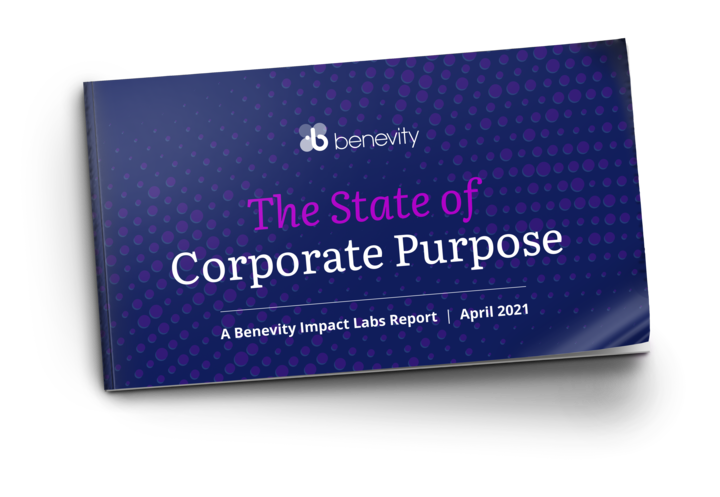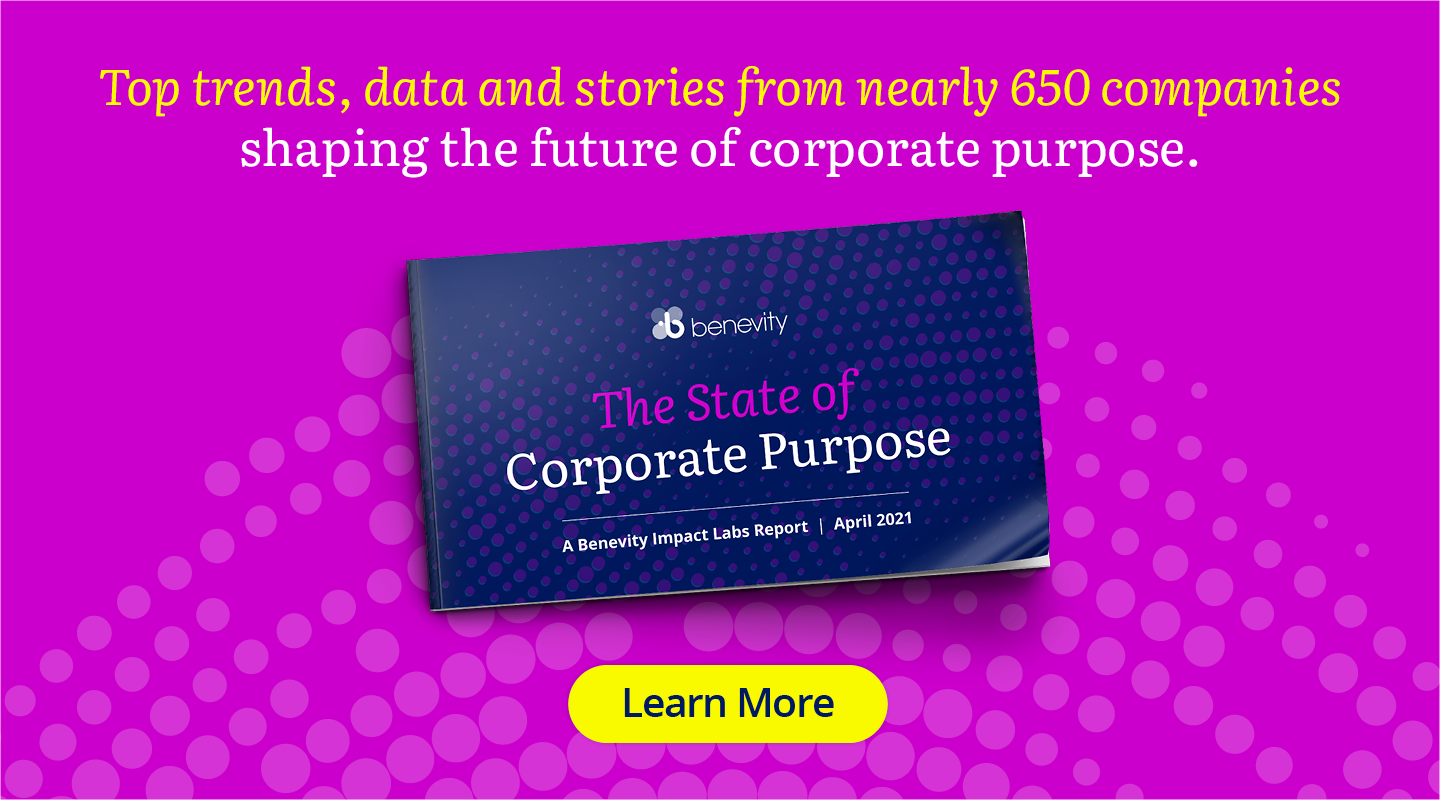Dolby Laboratories wasted no time in pivoting to virtual volunteering, beginning in March 2020. They began offering simple opportunities such as virtual resume workshops and career panels that were accessible to every person at every level of experience. By mid-April, they launched the VolunteerMatch integration in the Benevity platform to provide more virtual opportunities for their people, including skills-based options. Additionally, they built out their virtual strategy not just as a way to continue engaging volunteers through the COVID-19 lockdown, but for long-term engagement. These decisions led to their ability to host a globally inclusive Virtual Dolby Cares Week in April 2021.
The ways people do good in their everyday lives have been changing for years, but CSR hadn’t necessarily caught up — until 2020. Actions like recycling or signing a human rights petition are the norm for individuals in their personal lives. But for companies, offering opportunities beyond the traditional confines of volunteering and giving had been reserved for the few that were cutting edge.
COVID-19 illuminated a need to change and adapt, and over the past year we’ve seen companies lean into a broader definition of what it means to do good. In a time when people craved connection to their co-workers, communities and something bigger than themselves, and engaging employees became inexorably challenging, companies quickly pivoted their strategies to meet their people where they were.
Post-2020, a broader approach to impact is becoming table stakes.
Virtual volunteering becoming the norm
As mentioned earlier in the report, the first pivot that companies made was to virtual volunteering. The timing of the global lockdown in March, right before the busy volunteer season and just weeks before National Volunteer Week in North America, left companies either abandoning their plans or rewriting the volunteering playbook on the fly. While overall volunteering was down 20% year over year, it began to recover by the final quarter of 2020 when many companies and nonprofits had found ways to safely and effectively engage volunteers physically and virtually.
A total of 61,211 virtual volunteer opportunities were created in the Benevity platform in 2020. Halfway through the year, the share of virtual versus location-based volunteering began leaning heavily in favor of the former, with virtual volunteering comprising 61% of all opportunities by December 2020 or accounting for 42% of the full year’s share of volunteer opportunities. Unfortunately, the growth in virtual volunteering was not able to make up for the shortfall created by the precipitous fall of location-based opportunities.
In 2020, Atlassian pivoted quickly to virtual volunteering. They offered weekly “Do Good Happy Hours” where volunteers met with a new nonprofit and completed a small activity afterward, such as card making, calling a senior or coaching students to prepare for job interviews. These sessions resulted in higher engagement than in-person volunteering due to lower time commitment and geo-agnostic activities that enabled employees to participate from different time zones. The team used these findings to transition into quarterly campaigns involving fundraising, global volunteer activation and a virtual global week of good.
.png)


"We're building resources that are helpful now as well as for the future successes of our program. We know that as we come out of this pandemic, whatever that looks like, there will potentially be a lot of people who will continue to work remotely who haven’t in the past. Because of this, we’re building tools for their continued engagement."
— Simone Price
Community Relations Manager, Dolby Laboratories
Volunteer acts of kindness
Beyond virtual volunteering, our data shows a record number of volunteer opportunities in 2020 with no specific nonprofit attached, which we have defined as “volunteer acts of kindness.” These actions did not necessarily support a discrete cause, but instead they directly supported the end recipient, like doing Zoom crafts with a co-worker’s child or dropping off groceries for a neighbor in need.
In 2020, 39% of all volunteer opportunities were volunteer acts of kindness, and companies that expanded their programs to include this type of volunteering saw participation increase 2.2 times, compared to those that only offered volunteering with causes attached.
Warner Brothers
When Warner Bros.’ in-person volunteer events had to be canceled last April, the company decided to expand the definition of volunteering with acts of service campaigns. The studio ran three campaigns — Cleanliness, Kindness and Virtual Volunteering — enabling employees to enact everyday actions to promote health and well-being in their communities. Warner Bros.’ kindness campaign featured volunteer acts of service to encourage employees to help neighbors and people in their community, which included making masks for the Children’s Hospital Los Angeles; buying groceries for people quarantined at home; joining the Special Olympics Dance Challenge to share support for inclusion; hosting a digital dance party, sing-along or book club; starting a neighborhood teddy bear or rainbow hunt; and writing inspirational chalk messages on their driveway.
"It is our hope that by expanding our definition of volunteerism during these challenging times, our employees will feel supported and empowered to take action through everyday acts of Goodness.”
— Maggie McEldowney,
Community Engagement Specialist,
Warner Bros. Entertainment
Companies as the source of
trusted information
(and action)
For the past few years, the Edelman Trust Barometer has highlighted “My Employer” as the most trusted source of information. And 2020 was no different.
With the confusing events flowing from COVID-19 and the murder of Black people, and with so much distrust in media and government, people turned to their employers to help them sift through fake news and get a more fact-based perspective. As a result, we saw companies leaning into their role as a trusted source of information and incorporating learning and personal growth as part of their corporate purpose programs. In fact, we saw a staggering 244% year-over-year growth in the number of companies adding learning and positive actions to their programs, with a 250% growth in the number of activities tracked.
Interestingly, the top three themes of activities tracked were around health and wellness, diversity and inclusion, and environmental sustainability. This data highlights the unique role business has to play in helping people with their personal sense of well-being and impact, alongside their professional development.
Companies: Catalysts for Awareness and Learning
Adding learning and positive actions to a company’s corporate purpose initiatives has many benefits, including increased participation in every aspect of their program. Companies that empower learning and action see a 47% higher overall participation, 116% higher volunteering participation, 36% higher giving participation and 24% higher terms of use acceptance — signaling that positive actions are an entry point for Goodness and an engagement driver.
Did You Know?
Positive actions provide the important awareness and learning step that often leads to engagement in giving, volunteering and eventually co-creating opportunities for others to take action. Our comparative analysis shows that clients that include learning and positive actions (like Benevity’s Missions module) have a 40% greater likelihood of improving their overall annual participation rates compared to companies that did not include them.
Positive Actions Bridge DEIB and CSR
As diversity, equity, inclusion and belonging (DEIB) top the executive agenda, we are seeing more companies recognize the opportunity to increase the connection between their DEIB and CSR efforts.
Many companies are activating their DEIB strategies by offering learning and awareness content through their corporate purpose programs, thereby creating a single destination for their people to access information, with the ability for program leaders to track and measure engagement. The learning content is complemented by positive actions an individual can take to translate the information into inclusive habits and behaviors that influence them and their networks and can have a company- or community-wide effect.
DEIB leaders are also engaging their employee resource groups (ERGs) to help develop, promote and share this learning content, alongside opportunities to donate to and volunteer with organizations that are working in their cause area. This is empowering ERGs to digitally scale their initiatives and impact across multiple audiences who may otherwise be hard to reach, especially as travel and live events continue to be restricted.
In the Trust-Based Philanthropy Takes Hold section, we share how ERGs are also supporting corporate grantmaking and nonprofit partnerships.
Sustained progress will be critical in a hybrid future
While corporate purpose programs have been evolving for years, 2020 accelerated the need for companies to reimagine what impact looks like. The creative ways they solved challenges in the past year will long outlast the pandemic. Over the next few years, as more people choose to work from home full time or part time, and companies hire more remote employees, the workforce will become more dispersed than ever. Providing ways to connect will be the key to a healthy workforce, a unified culture and engaged employees.
Data from both the Centers for Disease Control and Prevention (CDC) in the U.S. and Centre for Addiction and Mental Health (CAMH) in Canada show that loneliness, addiction and other mental health issues continue to climb, despite the illusion of being connected and “in it together.” So providing a sense of well-being, meaning and impact to employees and community members will be essential.
Prevention (CDC) in the US and Center for Addiction and Mental Health (CAMH) in Canada shows that loneliness, addiction and other mental issues continue to climb despite the illusion of being connected and “in it together,” so the ability to provide a sense of well-being, meaning and impact will be essential. And as mental health at work and diversity, equity and inclusion top the executive agenda, we will see empathy, self-awareness and listening become essential skills for everyone.
In short, purpose will matter more than ever and embracing an expanded definition of impact—with the programmatic changes that flow from that widened aperture--will be a must-have, not a nice-to-have.

The 2020 Benevity Impact Report
Purpose has been recognized as a key component of long-term business resilience and sustainability — and it's driven a significant increase in all aspects of corporate purpose. The Benevity client community created record-breaking impact in 2020 and we're sharing all the details as part of The State of Corporate Purpose report.


